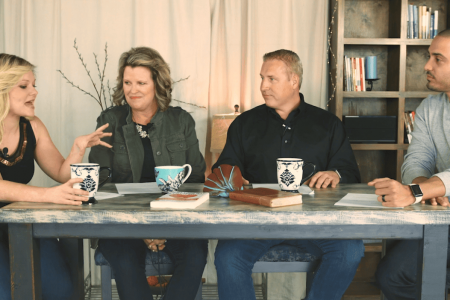“Your call is important to us. Please hold for the next representative.”
What’s your reaction when you hear those words? You’re probably thinking, If you really thought my call was important, you’d have someone pick up the phone and talk to me. The company’s words are carefully crafted to make us want to trust them, but they often ring hollow and insincere.
Have you ever been talking to your spouse about something important, but they seem a million miles away? They might say all the right words (“I’m listening . . . that makes sense . . . yes, I’m paying attention . . . whatever you decide is fine.”), but it feels like you’ve got a recording that says, “All of our representatives are busy.”
In marriage, we can’t automate our communication. Trust is built in a relationship through words and time. The words we use early in a relationship help us determine the level of trust we have with the other person. Over time, that trust increases as we learn to feel safe with them, knowing that we’ll still be loved and accepted just the way we are — even when we disagree.
The words we use can be a key factor in building trust. Here are a few examples of words and phrases that characterize high trust in a relationship. Block time to go through them with your spouse and reflect on how often each one appears in your conversations. It’s not a test that you pass or fail; it’s simply a chance to evaluate your communication and strategize for growth.
“I was wrong.”
I was absolutely sure the roofers would paint the trim boards they had to replace. “They wouldn’t leave a job unfinished,” I confidently said to my wife. She, however, believed we would have to do it ourselves. I was frustrated that she couldn’t understand the obvious — which made it even tougher when the roofer said, “No, we don’t do any painting.”
I could have ranted about the business and how it made no sense. But my relationship with my wife is what’s important, not my relationship with the roofer. I took a deep breath and said, “You were so right, and I was so wrong.” It was that simple — and we were OK.
Strong people admit when they’re wrong, which builds trust. Weak people ignore their mistakes or defend them, which weakens trust.
“Tell me about it.”
It’s easy to ask, “How was your day?” But since your spouse can respond with a one-word answer, it feels routine and disengaged. Instead, say, “Tell me about your lunch with your friends today.” It’s an open-ended question that shows you were listening and allows them to share the details. Listen carefully. Ask clarifying questions. It builds trust because it shows your genuine engagement.
Any time your spouse tells you about something that happened, slow down, look them in the eye and say, “Tell me about it.”
“Help me understand.”
Disagreements start with a difference in perspective. Your spouse has their own way of seeing things. Most couples argue by repeating their position louder and louder; but when their spouse is talking, they’re not listening — they’re just planning what they’ll say when it’s their turn.
When you feel your emotions rising during a discussion, slow down and say, “Help me understand.” Set aside your agenda and listen without interrupting or planning your reply. Ask clarifying questions without adding anything to what they’re saying. If you just let them talk, they’ll see your focused attention as a gift — and will be more inclined to do the same with you. “Help me understand,” is a phrase that de-escalates tough conversations and opens the door to genuine, trusting connection.

How Healthy is the Conflict in Your Marriage?
“What can I do differently?”
When someone we trust genuinely asks us our opinion, it feels good. When you say, “What can I do differently?” it gives your spouse permission to speak into your life. You’re not asking for a list of things you need to fix but for ways you can fine-tune the good things in your relationship. You want to grow, and your spouse will appreciate the invitation to be part of the journey.
“I couldn’t have done it without you.”
Gratefulness only has an impact when it’s expressed. Whenever you have a success, tell your spouse about it so they can share in your joy. They may not have been directly involved, but let them know you appreciate their support — and the opportunity to do these life experiences together. In marriage, two become one — so both are a part of every outcome.
“What do you think? This one is your call.”
You’re going out to dinner, and you both have different places you’d like to go to. If it really doesn’t matter, let your spouse make the decision. Then agree that you’ll decide next time.
In marriage, picking your battles is important. Hold the little decisions loosely and save your best communication and negotiating skills for those issues that really matter most.
This isn’t an exhaustive list, but simply a place to begin. Talk with your spouse about other words and phrases you might add in your own relationship. When they’re uniquely yours, it builds trust because you can share your heart and know you’ll be valued and treasured. Each trusting conversation reinforces the foundation your marriage is being built on.
Scripture tells us that “death and life are in the power of the tongue.” If words are that important, we should not be casual about them. Recognize their power for change, and they become powerful tools in your relationship.



















